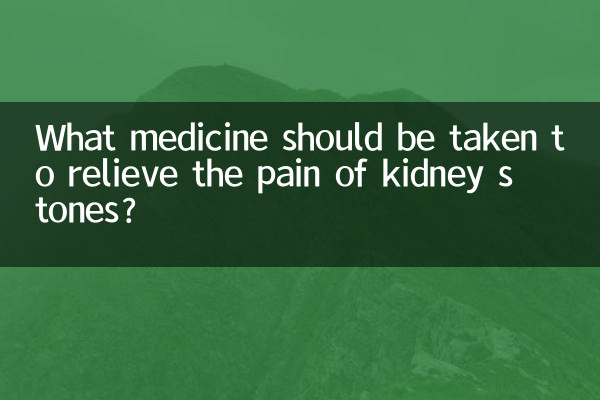What medicine should be taken to relieve the pain of kidney stones?
Kidney stones are a common urinary system disease that is often accompanied by severe pain, seriously affecting the patient's quality of life. For the pain caused by kidney stones, rational use of medication is key. This article will combine the hot topics and hot content on the Internet in the past 10 days to give you a detailed introduction to drug selection and precautions for kidney stone pain relief.
1. Causes of kidney stone pain

Kidney stone pain is usually caused by stones blocking the urinary tract, preventing normal urine discharge, causing increased pressure in the renal pelvis and ureteral spasm. The degree of pain depends on the size and location of the stone, as well as personal tolerance.
2. Classification of commonly used analgesics
| drug type | Representative medicine | Mechanism of action | Things to note |
|---|---|---|---|
| NSAIDs | Ibuprofen, diclofenac | Inhibits prostaglandin synthesis, reducing inflammation and pain | Use with caution in those with gastrointestinal discomfort |
| Antispasmodics | Anisodamine, phloroglucinol | Relaxes ureteral smooth muscle and relieves spasm | May cause dry mouth and blurred vision |
| opioid analgesics | tramadol, morphine | Acts on the central nervous system, providing powerful analgesia | A doctor’s prescription is required to prevent addiction. |
| alpha blockers | Tamsulosin | Dilate the ureter and promote stone expulsion | May cause orthostatic hypotension |
3. Clinical recommendations for drug selection
1.mild pain: Non-steroidal anti-inflammatory drugs (such as ibuprofen) are preferred and can be used in conjunction with antispasmodics.
2.moderate pain: It is recommended to use NSAIDs and antispasmodics in combination.
3.severe pain: Opioids need to be used under the guidance of a doctor, and imaging examinations must be performed to evaluate the stone condition.
4. Adjuvant therapeutic drugs
| drug type | Representative medicine | function | Applicable situations |
|---|---|---|---|
| stone removal drugs | Money grass granules | Diuretic and relieve stranguria, promote stone discharge | Small stones (<6mm) |
| alkaline drugs | Potassium citrate | Alkalinizes urine and dissolves uric acid stones | Patients with uric acid stones |
| antibiotics | Levofloxacin | Prevent and treat urinary tract infections | Co-infected persons |
5. Medication precautions
1.Strictly follow medical advice: Especially for opioids, the dose cannot be adjusted by yourself.
2.Drug contraindications: NSAIDs are contraindicated in patients with severe renal insufficiency.
3.Medication time: Antispasmodics should be used early in the onset of pain for better results.
4.Hydration: Drink 2000-3000ml of water every day to help expel stones.
6. When Do You Need Medical Treatment?
You should seek medical attention immediately if you experience the following conditions: severe pain that lasts for more than 12 hours, high fever with chills, no urine or oliguria, repeated vomiting and the inability to eat.
7. Suggestions for preventing recurrence
1. Adjust diet according to stone composition
2. Maintain moderate exercise
3. Regular review of urinary system ultrasound
4. Control weight and avoid obesity
Kidney stone analgesic treatment requires an individualized plan. It is recommended to use medications rationally under the guidance of a professional doctor. Do not blindly buy analgesics on your own. At the same time, only by identifying the causes of stones and carrying out targeted prevention can we effectively reduce recurrence.

check the details

check the details